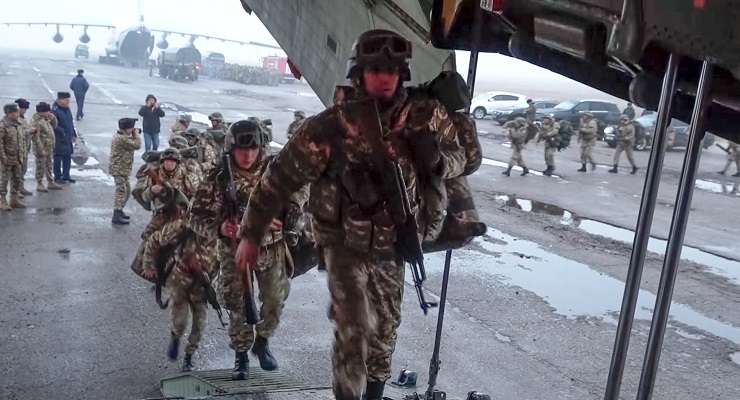
Thousands of troops from a Russian-led security alliance arrived in Kazakhstan on January 6 at the request of the country’s president, who has vowed to restore order amid spiraling unrest that has left dozens of protesters dead, according to local police.
The protests began on January 2 over a hike in fuel prices but quickly spread throughout the country, driven by long-standing grievances over corruption and inequality. In the country’s former capital, Almaty, demonstrators clashed with police and set fire to government buildings. On Friday, Kazakh President Kassym-Jomart Tokayev said he had authorised the use of lethal force against protesters.
The protests are unprecedented in oil-rich Kazakhstan, the wealthiest country in Central Asia and one that has been ruled with an iron fist for three decades. Another first: the deployment of troops from the Russian-led Collective Security Treaty Organization (CSTO) for the first time since its founding.
The dispatch of 2500 troops from the alliance has sparked fears that Moscow could use the crisis to strengthen its influence over Kazakhstan, which has long toed a careful line between Russia and the West.
“It means that Kazakhstan has turned away from its multivector foreign policy, where it was balancing China, Russia, the US, and the EU,” said Jennifer Brick Murtazashvili, an expert on Central and South Asia at the University of Pittsburgh.
The Kazakh president’s decision to call in the CSTO stunned many Kazakhs and international observers. While the alliance has been around for almost 30 years, it’s kept a low profile beyond the region. Here are three big things you need to know about the alliance and what makes its deployment to Kazakhstan so significant.
What is the CSTO?
In 1992, in the wake of the collapse of the Soviet Union, several members of the Commonwealth of Independent States, all former members of the Soviet bloc, got together and signed a mutual defense pact known as the Collective Security Treaty, a smaller and less influential successor to the Cold War-era Warsaw Pact.
Members came and went, and in 2002 it reconstituted as the Collective Security Treaty Organization, receiving observer status at the United Nations two years later. Aside from Russia, it currently includes five other members: Tajikistan, Kyrgyzstan, Armenia, Belarus, and Kazakhstan.
Like NATO, the CSTO is based on the principle of collective defense: an attack on one member state is taken as an attack on all members of the alliance. The alliance conducts joint military exercises and facilitates arms sales between members, but in recent years its sense of purpose has begun to languish.
In a region that is no stranger to the occasional revolution and border skirmish, this week marks the first time in the organisation’s 30-year history that it has responded to a call for assistance from a member state. Belarus did not ask the bloc to intervene during mass unrest in 2020 over falsified election results while Armenian officials were disappointed with the CSTO’s response to its calls for assistance amid a border dispute with Azerbaijan last year.
On Wednesday, Armenian Prime Minister Nikol Pashinyan, the CSTO’s current chair, announced that the alliance would be dispatching 2500 “peacekeeping troops” in response to Tokayev’s request for assistance. He did so under Article 4 of the organisation’s treaty, which can be triggered in the event of an attack against member states that threatens their safety, stability, or territorial integrity.
While Pashinyan referred to “external interference” in Kazakhstan in a Facebook post announcing the deployment, there is no evidence to suggest that foreign actors were involved in stirring unrest. Leaders across the region, no more so than in Russia, routinely frame domestic challenges to their rule as shadowy plots by Western intelligence agencies.
(It should be noted that some experts believe that criminals and politically connected gangs may have seized upon the initial protests to fuel unrest. “We shouldn’t call all these people protesters,” said Nargis Kassenova, a senior fellow at Harvard University’s Davis Center for Russian and Eurasian Studies, at an Atlantic Council event on Friday.)
What’s the big deal about 2500 peacekeepers?
In Kazakhstan, whose territory is roughly the size of Western Europe, 2500 peacekeepers may not sound like a big deal, but the very fact that Tokayev was so quick to request assistance from the CSTO signals a profound break with 30 years of Kazakhstan’s foreign policy.
“Symbolically, this is huge, when you ask another country to come and shoot at your own citizens,” Murtazashvili said. Inviting foreign troops to defend Kazakh institutions from their own citizens raises profound questions for the country’s sovereignty, she added.
Many questions remain, including why the president was so hasty to call for external support and whether any internal power struggles fueled the decision. “I think the question we’re asking is, did Tokayev not trust the military?” Murtazashvili said.
Tokayev, a former diplomat, became president in 2019 after Kazakhstan’s longtime dictator Nursultan Nazarbayev stepped down in a carefully managed transfer of power. Nazarbayev stayed in the limelight as head of the country’s powerful Security Council until Wednesday, when Tokayev relieved him of his duties.
On Friday, independent Russian media outlet Dozhd reported that Kazakh leaders had stopped referring to the country’s capital as Nur-Sultan, whose previous name, Astana, was recently changed to glorify Nazarbayev, in a possible sign that the former president had fallen out of favour.
Speaking to Kazakhstan’s Khabar 24 television that same day, Dauren Abayev, deputy head of the country’s Presidential Administration, said CSTO troops had been dispatched to protect government buildings and would not be directly involved in operations against protesters. But the deployment has sparked concern that the troops could linger in the country. Once deployed, Russian peacekeepers have a habit of sticking around — Russian peacekeepers deployed to breakaway regions of Georgia and Moldova in the early 1990s remain there today.
US Secretary of State Antony Blinken on Friday cautioned against conflating the crisis in Kazakhstan and the Russian military build-up near the border with Ukraine. Yet speaking about the deployment of Russian peacekeepers to Kazakhstan, he did make a point to note that “one lesson of recent history is that once Russians are in your house, it’s sometimes very difficult to get them to leave”.
The four-star Russian general in command of the CSTO troops in Kazakhstan, Andrey Serdyukov, led Russian forces during the annexation of Crimea and commanded Russian troops in Syria.
What does this mean for Kazakhstan — and for the CSTO?
Less than a week into the crisis, it’s difficult to tell exactly where this is heading and how it will impact Kazakhstan’s decades-long effort to balance Russia, China, and the West. In a series of tweets in English on Friday justifying his decision, Tokayev noted that “the policy of open doors to the foreign direct investments will remain a core strategy of Kazakhstan”, in an apparent attempt to soothe skittish partners.
The deployment of Russian troops as peacekeepers under the auspices of the CSTO could also be an instrumental test balloon for the Kremlin of its ability to tip events in the region in its favor without getting bogged down.
Speaking at the Atlantic Council event, former US Ambassador to Kazakhstan William Courtney said a concern to watch out for is whether Russian forces congregate in northern regions of Kazakhstan, which have significant populations of ethnic Russians and have long been a fixation of Russian nationalists.
Writing in Foreign Policy, journalist Casey Michel notes that a repeat of Russia’s annexation of Crimea and invasion of Ukraine is unlikely. But in a week of unprecedented events, it bears paying attention to.
“For now, though, it seems Moscow, along with Tokayev and his allies, is focused primarily on shoring up the regime and squelching any protests or thoughts of pro-democracy reform,” Michel notes. “But given how abruptly the ground has shifted in Kazakhstan in just a few days, possibilities previously dismissed are suddenly front and center.”









The Russians bear watching in Kazakhstan, but for a US government official to state “one lesson of recent history is that once Russians are in your house, it’s sometimes very difficult to get them to leave”, without a sense of irony (never mind hypocrisy) is classic – ask Syrians, Iraqis and many others!
You left out Japan, Germany the UK, Turkey, Phillipines to name but a few more
Australia
Always good to get the PC riding instructions, fresh off the Langley VA teletype – it shows the hegemon, like the chocolate biscuit, has forgotten nothing & learned nothing since the Gulf of Tonkin.
The place is run by a dictator- who better to help than another one. This it basic autocratic behaviour.
The US is in no position to do anything realistic about it as it has withdrawn from that area of the world since the Failure in Afghanistan. Let the two dictators dictate and hope they don’t throw any sand out of the sandbox.